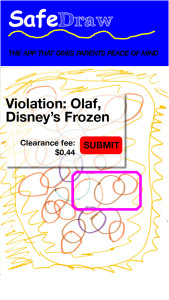A rash of intellectual property lawsuits has made news lately. Whether it’s Tom Petty suing Sam Smith over two songs that happen to sound eerily similar or the NFL attacking inappropriate use of the term “Super Bowl,” the message is clear: stealing someone else’s ideas can come back to bite you in the wallet.
A new app was released today in both the Apple App Store and Google Play Store that can help parents of young children ensure they won’t accidentally wander into a minefield of lawsuits when they proudly display their kids’ artworks on social media.
The app, called SafeDraw, quickly scans drawings and three-dimensional creations, like popsicle sculptures and bottle cap collages, to check for possible copyright or trademark violations before allowing them to be displayed publicly. This new parenting aid was developed jointly by the Motion Picture Association of America and the nonprofit Council for Right Families. The groups have negotiated deals with most major movie studios, as well as toy makers and book and comics publishers, and the app enables parents to immediately make a payment to secure appropriate rights to their children’s drawings. SafeDraw then easily posts cleared image to Facebook, Twitter, Instagram, and Pinterest.
Former Republican Congressman Mark Lynch is now the head of CRF, and he says, “Millions of families are at grave risk, and many don’t even know it. I have personally heard of many terrible cases. There’s a plumber in Indiana who called us because his daughters made a chalk drawing outside his house that was clearly derivative of The Little Mermaid, a Disney product. Well, that drawing was captured when a Google Street View car went by, and he ended up in court. He lost his business and descended into drink, drug abuse, and eventually homelessness.” Lynch says his organization is focused on helping parents adjust to the new world, in which nearly every idea or expression is owned by someone. “We think it’s our duty to give parents the means to defend themselves against this modern threat, just like they should keep guns in the house to defend against other threats.”
 The MPAA did not respond to requests for an interview, but the press kit accompanying the launch of SafeDraw quoted MPAA CEO Christopher J. Dodd as saying, “All of the businesses we work with bent over backward to offer reasonable rates for use of their intellectual property. Big business would hate to see anything bad happen to average Americans. But intellectual property is property, and society depends on a vigorous defense of property rights. This industry won’t fall down in its duty to make that defense.”
The MPAA did not respond to requests for an interview, but the press kit accompanying the launch of SafeDraw quoted MPAA CEO Christopher J. Dodd as saying, “All of the businesses we work with bent over backward to offer reasonable rates for use of their intellectual property. Big business would hate to see anything bad happen to average Americans. But intellectual property is property, and society depends on a vigorous defense of property rights. This industry won’t fall down in its duty to make that defense.”
Leftist critics have attacked the app as one more attempt by businesses to use the law to their advantage. But Heath Snillfit, the Bertelsmann Professor of Legal Studies at the Wye Sprite University School of Law, argues that this app will help the common person. “I’ve been in this IP thing for 25 years,” says Snillfit, “and this is the best tool I’ve ever seen to help non-lawyers stay within the bounds of the law. Remember, law is meant to protect the weak from the powerful and to avert injustice and tyranny, and who would be weaker than those children who might be thrown into a lifetime of debt by one errant stroke of a marker? This is about the children.” Snillfit points to a yellowed sheet of paper taped to his wall. It has a large heart drawn on it, and the words, “Happy Fathers Day!” He explains, “My daughter did that about 15 years ago. She was really into Care Bears at the time. I wish I’d had an app like this to check her drawings. It would have given me peace of mind.”
Media analyst Eliza Halson hails SafeDraw as a step toward the future of culture. “We don’t have myths and folktales anymore to shape our worldview and help us cope with our greatest fears and challenges. We have TV series and other studio products. What would happen if this essential nutrient for our culture were to disappear one day? We would all starve culturally. We should be glad to pay a royalty or two to keep that from happening.”
Halson continues, “There is no personal anymore. We have to let go of quaint notions like individuality. With the everyone on social media, we’re all media companies now, promoting our individual brands, producing content. We need to take on the responsibilities of being businesses, not just people.”


